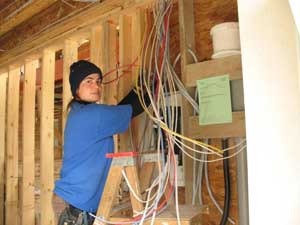Electrician
Tasks & duties

Electricians may do some or all of the following:
-
meet with clients to discuss installation, maintenance or repair of electrical wiring and equipment
-
study and interpret wiring diagrams and floor plans
-
install electrical wiring and equipment
-
repair or replace electrical wiring and equipment
-
purchase materials and equipment needed to install or repair electrical wiring and equipment
-
test electrical work for safety
-
keep records of the problems they find with electrical equipment and the servicing they carry out
-
prepare quotes for clients to install, repair or replace electrical wiring and equipment
-
discuss the cost of this work with clients
Specialisations
Electricians usually specialise in the industrial, domestic or commercial area. However, the skills required to perform each type of electrical work are transferable.
Skills & knowledge

Electricians need to have:
-
knowledge of electrical theory
-
knowledge of electrical legislation, codes, and standards of practice
-
knowledge of how to install electrical wiring and equipment
-
excellent communication skills
-
the ability to read and interpret wiring diagrams and floor plans
-
good problem-solving skills for diagnosing electrical faults
-
basic maths and physics skills
-
record-keeping skills
-
first aid and cardio-pulmonary resuscitation (CPR) skills
-
knowledge of safety procedures
Entry requirements
To become an electrician you need to complete an apprenticeship and gain a National Certificate in Electrical Engineering or a National Certificate in Electricity Supply.
Switched on Careers website - ETITO's apprenticeship zone
Electricity Supply Industry Training Organisation (ESITO) website - industry training information
Electrician apprenticeships are part of the Modern Apprenticeships scheme, which is for people aged 16 to 21.
Secondary education
School Certificate or NCEA Level 1 English, maths and science is needed. However, Sixth Form Certificate or NCEA Level 2 in these subjects and physics is an advantage.
Training on the job
During your apprenticeship training you are supervised by a registered electrician and your skills are assessed.
Electricians may attend workshops, seminars or training courses to keep up to date with the latest electrical cabling, equipment and fittings.
Registration
Electricians need to be registered with the Electrical Workers Registration Board. To apply for registration you need to have a National Certificate in Electrical Engineering or a National Certificate in Electricity Supply and pass an electrical regulations exam.
Useful experience
A pre-apprenticeship National Certificate in Electrical Engineering Level 2 or a National Certificate in Electricity Supply Level 2 can be helpful to gain background knowledge of electrical theory and safety.
Useful experience for electricians includes electrical appliance repair work, or work as an electrical engineering technician or electrical labourer.
Video
From just a job on you tube
Related courses
Electrical Engineering
Electrical Fitting, Electrical Mechanics
Electronic Equipment Servicing
For more information, please refer to Career Services.
Document Actions
